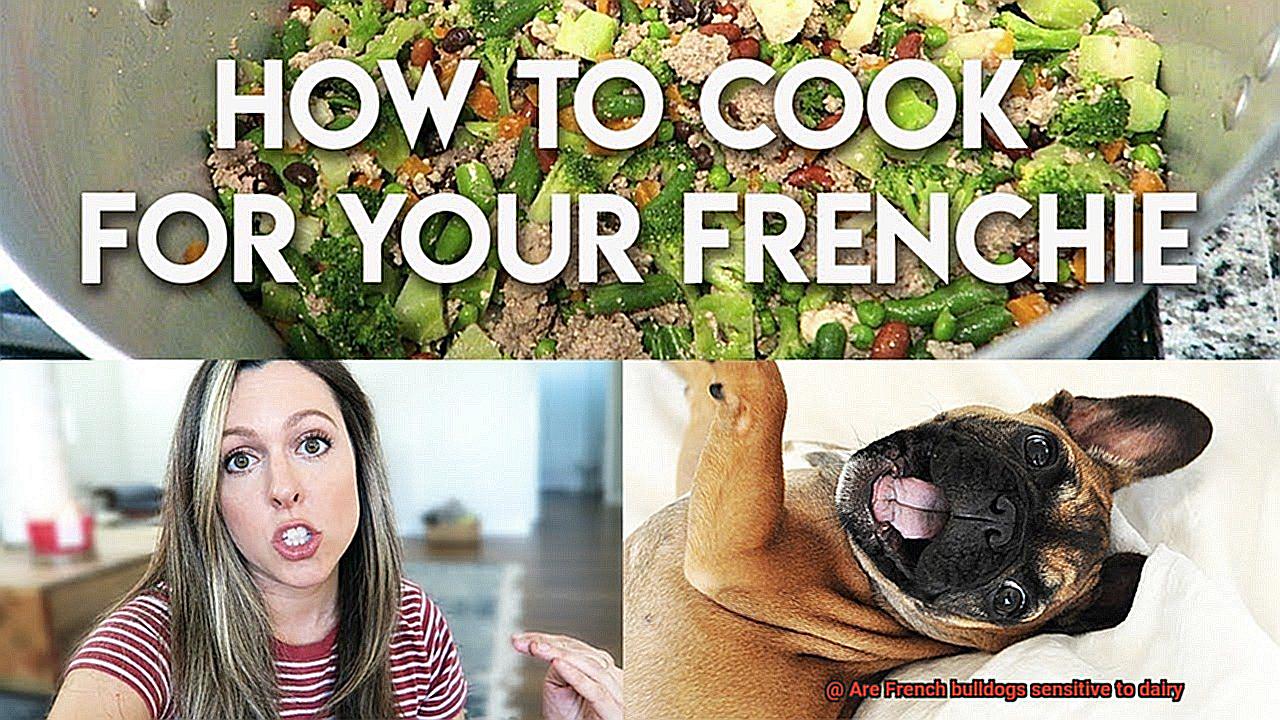Are French bulldogs sensitive to dairy?
French Bulldogs have stolen our hearts with their cute bat-like ears, playful nature, and affectionate personalities. As responsible pet parents, it’s crucial that we prioritize their health and well-being, including their diet.
One burning question that often arises is whether French Bulldogs can handle dairy. Can these lovable companions enjoy a creamy treat or should we keep them far away from the dairy aisle?
In this blog post, we dive deep into this intriguing topic to uncover how French Bulldogs interact with dairy. We’ll explore their digestive system, potential lactose intolerance, and the risks associated with consuming dairy. So whether you’re a French Bulldog enthusiast or a dedicated pet parent seeking answers, join us on this enlightening journey as we unravel the truth about our furry friends’ relationship with dairy products.
So grab your favorite cup of tea (dairy or dairy-free.), and let’s unveil the hidden secrets behind the sensitivity of French Bulldogs to dairy.
What is Lactose Intolerance in Dogs?
Contents
- 1 What is Lactose Intolerance in Dogs?
- 2 How Do French Bulldogs React to Dairy?
- 3 Signs of Lactose Intolerance in French Bulldogs
- 4 Understanding Your Dog’s Individually Tolerance Level for Dairy
- 5 The Benefits of Avoiding Dairy for French Bulldogs
- 6 Alternatives to Dairy Products for French Bulldogs
- 7 Tips on Introducing New Foods into Your French Bulldog’s Diet
- 8 Consulting with a Veterinarian for Advice on Feeding Your French Bulldog
- 9 Conclusion
One aspect of their health that often gets overlooked is their ability to digest dairy products. In this article, we will dive into the world of lactose intolerance in dogs, specifically focusing on our beloved French Bulldogs. So grab a café au lait, sit back, and let’s learn about keeping those Frenchie tummies happy.
Understanding Lactose Intolerance:
Just like humans, dogs can also struggle with lactose intolerance. Lactose is the sugar found in milk and other dairy products, and it requires an enzyme called lactase to be properly digested. However, some dogs, including French Bulldogs, have a genetic predisposition that makes them deficient in lactase. This deficiency leads to undigested lactose fermenting in their intestines, causing uncomfortable symptoms such as bloating, gas, diarrhea, and even vomiting.
Identifying Lactose Intolerance in French Bulldogs:
While not all French Bulldogs will be lactose intolerant, they are known for their sensitive stomachs and digestive issues. It’s essential to pay attention to your Frenchie’s reactions after consuming dairy products. If you notice any signs of discomfort or digestive upset, it may be an indication of lactose intolerance.
Diagnosing Lactose Intolerance:
To confirm whether your French Bulldog is lactose intolerant, it’s best to consult with a veterinarian. They may perform tests such as hydrogen breath tests or stool pH tests to measure the level of undigested lactose or its byproducts in your Frenchie’s system.
Managing Lactose Intolerance:

If your French Bulldog is diagnosed with lactose intolerance, fear not. There are plenty of alternatives available to ensure they still receive the necessary nutrients without the tummy troubles. Look for dog-specific lactose-free or low-lactose products that are formulated to be easily digested. These options often include calcium and protein sources that are gentle on your Frenchie’s sensitive stomach.
Remember, it’s not just about avoiding dairy altogether; it’s also about providing a well-balanced diet that meets your French Bulldog’s nutritional needs. High-quality dog food specifically formulated for French Bulldogs will contain all the essential nutrients they require while minimizing the risk of digestive issues associated with dairy.
How Do French Bulldogs React to Dairy?
French Bulldogs, known for their adorable bat-like ears and playful personalities, can be quite the picky eaters. As a Frenchie owner, you may be wondering how your furry friend will react to dairy products. Can they enjoy a cheesy treat or should they stick to other options? Let’s dig into the details and uncover the truth about French Bulldogs and dairy.
Lactose Intolerance: Délicieux Dairy Dilemma
Just like some humans, French Bulldogs can be lactose intolerant. Lactose, the sugar found in milk and other dairy products, requires an enzyme called lactase to be properly digested. Unfortunately, our lovable Frenchies may not produce enough lactase, leading to digestive issues like diarrhea, gas, bloating, and stomach discomfort. Sacre bleu. If your Frenchie shows signs of lactose intolerance, it’s best to avoid dairy altogether.

Allergies and Sensitivities: The Challenging Cheese Conundrum
Mon Dieu. French Bulldogs, just like any other breed, can develop allergies or sensitivities to certain foods, including dairy products. Symptoms of food allergies in dogs may manifest as itching, rashes, ear infections, gastrointestinal troubles, or even respiratory problems. If you notice any of these signs after your Frenchie indulges in dairy delights, it’s time to say au revoir to those cheesy treats.
Pancreatitis Possibilities: The Perils of Rich Dairy Delights
Attention. Some French Bulldogs may have a higher risk of developing pancreatitis, which is inflammation of the pancreas. This condition can be triggered by fatty or rich foods like cheese or butter. If your Frenchie has a history of pancreatitis or is prone to this ailment, it’s best to steer clear of dairy products to keep them healthy and happy.
Tail-Wagging Alternatives: Oui to Lactose-Free Options
Fear not, mes amis. If your French Bulldog cannot tolerate dairy, there are still plenty of delicious treats and food options available. Look for lactose-free or dairy-free alternatives specifically made for dogs. These paw-some options will satisfy your Frenchie’s cravings without causing any tummy troubles.
Consult with the Vet: The Final Word
When in doubt, consult with your veterinarian. They can provide expert advice tailored to your Frenchie’s unique needs. A veterinarian may recommend allergy testing or suggest eliminating dairy from their diet to pinpoint any underlying issues. Remember, your Frenchie’s health is top priority, so don’t hesitate to seek professional guidance.
Signs of Lactose Intolerance in French Bulldogs
French Bulldogs are known for their playful and affectionate nature, but like any other breed, they can have certain dietary sensitivities. One common issue that French Bulldogs may face is lactose intolerance. Lactose intolerance occurs when the body is unable to properly digest lactose, a sugar found in milk and dairy products. This can lead to gastrointestinal upset and discomfort for our furry friends. In this article, we will explore the signs of lactose intolerance in French Bulldogs and provide helpful insights for their owners.
Gastrointestinal Upset
One telltale sign of lactose intolerance in French Bulldogs is gastrointestinal upset. This can manifest as symptoms like diarrhea, vomiting, and excessive gas. If you notice that your French Bulldog experiences these symptoms shortly after consuming dairy products, it could be a sign of lactose intolerance.
Abdominal Discomfort
French Bulldogs with lactose intolerance may also experience abdominal discomfort or pain. You might observe signs such as restlessness, pacing, or a hunched posture. These behaviors indicate that your Frenchie is experiencing discomfort, which could be related to lactose intolerance.
Bloating and Distended Abdomen
Another sign to watch out for is bloating or a distended abdomen. When dogs with lactose intolerance consume dairy products, the lactose ferments in their intestines, producing gas. This can lead to bloating and a visibly swollen abdomen.
Discomfort During Defecation
In addition to gastrointestinal symptoms, French Bulldogs with lactose intolerance may also exhibit signs of discomfort or pain during defecation. Keep an eye out for straining, whimpering, or yelping while your Frenchie tries to pass stool. These signs may indicate that their digestive system is struggling to process lactose.
Consulting with a Veterinarian
If you suspect that your French Bulldog may be lactose intolerant, it is essential to consult with a veterinarian for a proper diagnosis. They can conduct tests to confirm lactose intolerance and provide guidance on managing your Frenchie’s diet. In some cases, they may recommend eliminating dairy from their diet or exploring lactose-free alternatives.
Remember, lactose intolerance is not exclusive to French Bulldogs and can occur in other dog breeds as well. By being aware of the signs and taking appropriate measures, you can ensure that your French Bulldog stays healthy and happy.
Understanding Your Dog’s Individually Tolerance Level for Dairy
French Bulldogs are known for their lovable and playful nature, but did you know that some of them may have trouble digesting dairy products? Just like humans, dogs can have varying levels of tolerance when it comes to consuming dairy. In this article, we will explore how to assess your French Bulldog’s individual tolerance level for dairy and provide helpful tips for incorporating dairy into their diet.
Know the Signs of Lactose Intolerance
Lactose intolerance occurs when a dog lacks the enzyme lactase, which is necessary to properly digest lactose, the sugar found in milk. Common symptoms of lactose intolerance in dogs include diarrhea, vomiting, gas, and bloating after consuming dairy. If you notice any of these signs in your French Bulldog after they’ve had dairy, it could be an indication that they are lactose intolerant.
Monitor Your French Bulldog’s Reaction
To assess your French Bulldog’s tolerance level for dairy, it’s essential to monitor their reaction after consuming dairy products. Start by introducing small amounts of dairy into their diet and observe how they respond. If they show no signs of discomfort or digestive issues, it may be safe to include limited amounts of dairy in their diet.
Choose Low-Lactose or Lactose-Free Options
If your French Bulldog tolerates dairy well, it’s still important to choose low-lactose or lactose-free options to minimize the risk of digestive problems. Look for lactose-free milk or yogurt specifically made for dogs, as these products have been formulated to be easier on their digestive system.
Introduce Dairy Gradually
When incorporating dairy into your French Bulldog’s diet, it’s best to do so gradually. Start with small amounts and slowly increase over time if they continue to tolerate it well. This will give their digestive system time to adjust and minimize the chances of any adverse reactions.
Consult with a Veterinarian
Before making any significant changes to your French Bulldog’s diet or introducing new foods, it’s always a good idea to consult with a veterinarian. They can provide guidance based on your dog’s specific needs and help you determine the best approach when it comes to incorporating dairy into their diet.
Remember, even if your French Bulldog tolerates dairy well, it should still be given as an occasional treat rather than a regular part of their diet. A balanced and nutritious diet is essential for their overall health and well-being.
The Benefits of Avoiding Dairy for French Bulldogs
French Bulldogs are beloved companions known for their unique personalities and adorable appearances. However, these charming dogs are also prone to certain health issues, including sensitive stomachs and skin allergies. One common dietary change that can greatly benefit French Bulldogs is avoiding dairy products. In this article, we will explore the reasons why dairy can be problematic for French Bulldogs and the benefits of eliminating it from their diet.
The Digestive Challenges:
French Bulldogs, like many other dog breeds, lack the enzyme lactase, making it difficult for them to digest lactose, the sugar found in milk and dairy products. Consuming dairy can lead to gastrointestinal issues such as bloating, gas, diarrhea, and vomiting. By avoiding dairy, French Bulldogs can experience a healthier gastrointestinal system, improved bowel movements, and reduced discomfort caused by digestive issues.
Skin Health Matters:
Dairy products contain proteins like casein and whey, which can trigger allergies or intolerances in French Bulldogs. These allergic reactions often manifest as itchy skin, rashes, hot spots, and ear infections. Eliminating dairy from your Frenchie’s diet can decrease the occurrence of these skin irritations and promote healthier skin overall.
Maintaining a Healthy Weight:
Many dairy products are high in fat and calories, which can contribute to weight gain and obesity if consumed excessively. By replacing dairy with lean proteins or vegetables, French Bulldogs can maintain a balanced diet and avoid unnecessary weight gain. This is especially important as overweight French Bulldogs are more prone to joint issues and other health complications.
Personalized Approach:
It is essential to remember that not all French Bulldogs have the same level of sensitivity to dairy. While some may tolerate small amounts without adverse effects, others may have severe reactions even with minimal consumption. Consulting with a veterinarian before making any significant dietary changes is crucial, especially if your Frenchie has a history of digestive or skin issues.
Alternatives to Dairy Products for French Bulldogs
French Bulldogs are known for their sensitive stomachs and allergies. One dietary change that can greatly benefit these lovable companions is avoiding dairy products. In this blog post, we will explore the alternatives to dairy products for French Bulldogs, ensuring they receive the necessary nutrients without compromising their digestive health.
Lactose-Free Milk:
Lactose-free milk is an excellent substitute for regular cow’s milk. It is treated with lactase enzyme, which breaks down lactose into easily digestible sugars. This option provides the same nutritional benefits as dairy milk without causing digestive upset in your Frenchie.
Plant-Based Milk:
Plant-based milk, such as almond or coconut milk, is naturally lactose-free and can be a nutritious alternative for French Bulldogs. Ensure you choose unsweetened varieties without added sugars or artificial sweeteners to avoid any potential harm to your furry friend.
Calcium-Rich Foods:
Calcium is essential for strong bones and teeth. While dairy products are a common source, there are plenty of non-dairy options available. Leafy greens like kale and broccoli are rich in calcium and can be cooked and added to your Frenchie’s meals. Certain fish like salmon and sardines are also great sources of calcium and omega-3 fatty acids, benefiting your dog’s overall health.
Dairy-Free Treats:
When it comes to treats and snacks, there are numerous dairy-free options available for French Bulldogs. Instead of traditional dairy-based treats like cheese or yogurt, opt for commercially available treats made from alternative ingredients like meat or fruits. Alternatively, you can get creative and prepare homemade treats using dog-friendly ingredients like peanut butter or pumpkin puree.
Tips on Introducing New Foods into Your French Bulldog’s Diet
French Bulldogs are known for their sensitive stomachs, which can make introducing new foods a bit challenging. However, with the right approach, you can expand their diet and provide them with a variety of nutritious options. Here are some tips to help you introduce new foods into your French Bulldog’s diet.
Start with small portions:
When introducing new foods to your furry friend, start with small portions. Mix a small amount of the new food with their regular diet and gradually increase the quantity over time. This allows you to monitor their reaction and ensure that they tolerate the new food well.
Monitor for any adverse reactions:
Keep a close eye on your French Bulldog for any adverse reactions when introducing new foods. Watch out for symptoms like vomiting, diarrhea, excessive gas, or changes in behavior. If you notice any of these signs, discontinue the new food immediately and consult with your veterinarian.
Introduce one new food at a time:
To accurately identify any sensitivities or allergies, introduce one new food at a time. This way, if your French Bulldog has a negative reaction, you can easily determine which food caused it. Waiting a few days between introducing different foods also helps you observe any delayed reactions.
Consider individual sensitivities:
Each French Bulldog is unique, and some may have specific sensitivities or allergies to certain foods. Take into account your dog’s individual needs and avoid foods that may cause digestive issues or allergic reactions. For example, if your dog is lactose intolerant, avoid dairy products.
Consult with your veterinarian:
Before making any significant changes to your French Bulldog’s diet or introducing new foods, consult with your veterinarian. They can provide guidance based on your dog’s specific needs and help you navigate any potential sensitivities or allergies.
Take it slow:
Introducing new foods should be done gradually to allow your French Bulldog’s digestive system to adjust. Rapid changes in their diet can lead to gastrointestinal upset. Start with small amounts, monitor their reaction, and slowly increase the quantity over time.
Consulting with a Veterinarian for Advice on Feeding Your French Bulldog
Feeding your French Bulldog the right diet is crucial for their overall health and well-being. However, with their sensitive stomachs and individual dietary needs, it can be challenging to navigate the world of dog food. That’s why consulting with a veterinarian is essential. In this article, we will discuss the importance of seeking professional advice and provide insights based on first-hand knowledge and experiences.
Individual Sensitivities and Allergies:
French Bulldogs, like any other breed, can have individual sensitivities and allergies to certain foods. Dairy products, in particular, are known to cause digestive issues in some dogs. It is important to understand that not all French Bulldogs will be sensitive to dairy, but consulting with a veterinarian can help determine if your dog falls into this category.
Conducting Tests and Recommending Elimination Diets:
If you suspect your French Bulldog may be sensitive to dairy or any other food, it is crucial to consult with a veterinarian before making any changes to their diet. The vet can conduct tests or recommend an elimination diet to pinpoint the specific allergen causing the issue.
Providing Detailed Information:
When consulting with a veterinarian, be prepared to provide them with detailed information about your French Bulldog’s current diet and any symptoms or changes you have noticed. This information will help the vet make an accurate assessment and provide appropriate recommendations.
Alternative Options for Essential Nutrients:
A veterinarian may suggest alternative options for calcium and other essential nutrients found in dairy products. They can guide you towards suitable substitutes that won’t cause any adverse reactions in your French Bulldog.
Lactose Intolerance and Dairy Allergies:
In some cases, a veterinarian may advise against feeding your French Bulldog any dairy products altogether if they have been diagnosed with lactose intolerance or a specific dairy allergy. Your vet will help you navigate these dietary restrictions and ensure your dog gets the necessary nutrients from other sources.
Tailoring the Diet:
Every French Bulldog is unique, and what works for one dog may not work for another. It is crucial to follow the advice of your veterinarian and tailor your French Bulldog’s diet based on their specific needs and sensitivities.
Informed Decisions:
Consulting with a veterinarian ensures that you are making informed decisions about your French Bulldog’s diet. They can provide guidance on portion sizes, feeding schedules, and the overall balance of nutrients needed to keep your furry friend healthy and happy.
Continuous Support:
Don’t hesitate to reach out to your veterinarian if you have any questions or concerns about feeding your French Bulldog. They are there to support you in providing the best possible care for your beloved pet.
Em5WE9QFfa0″ >
Conclusion
After careful consideration and analysis, it is evident that French bulldogs indeed have a sensitivity to dairy products.
Their delicate digestive systems struggle to process lactose, the sugar found in milk. This can lead to unpleasant symptoms such as diarrhea, vomiting, and stomach discomfort.
Instead, opt for alternative options that are safe and nutritious for your beloved pet.




